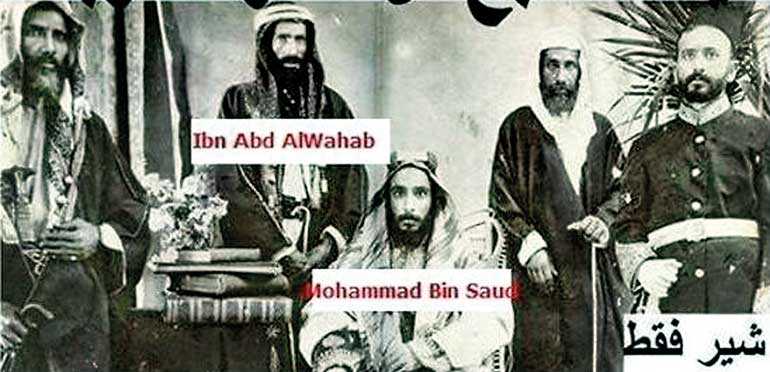Wahhabism / Salafism
Arab nationalism was used by the Jews and the British as a tool to incite rebellion among parts of the Arab population against the Ottoman Empire, despite the fact that Islam prohibits rebellion against a legitimate ruler. To circumvent this, Wahhabism was established, claiming that all other Muslims were kuffar (non-Muslims) and that only an Arab leader from the Saudi family should rule. Muhammad ibn ‘Abd al-Wahhab (1703–1792) and Muhammad bin Saud (1687–1765) drew on the teachings of Ibn Taymiyyah (1263–1328) to declare takfir (excommunication) on the Ottoman Caliph and other Muslims in an effort to establish an Arab dynasty under Saudi rule.
After their initial attempt failed, Wahhabism was expanded to get support from other Arabian leaders, ultimately evolving into modern Salafism. With support from European powers—through mass printing and dissemination of their doctrines, as well as British-supplied weapons—their ideology spread, resulting in significant bloodshed among Muslims. Eventually, the Jewish-British backed efforts succeeded in the establishment of the Kingdom of Saudi Arabia.
Doctrines
Muhammad Ibn ʿAbdul-Wahhab declared that tawassul (asking Allah by means of the Prophet ﷺ or righteous people) is shirk (polytheism). This is one of the earliest and central claims of Wahhabi doctrine.
“He falsely claimed visiting the grave of the Prophet… and performing the tawassul by him as shirk. Additionally, he falsely claimed visiting the graves of other prophets and righteous Muslims (awliya’) and performing tawassul by them was shirk as well.” — Fitnatul-Wahabiyyah, p. 3, section: Some of the Beliefs of Ibn ‘Abdul Wahhab

Ibn ʿAbdul-Wahhab taught that calling upon the Prophet ﷺ or righteous Muslims—alive or dead—is an act of major polytheism (shirk akbar), equating it with idol worship.
“He added to this by saying, ‘To call upon the Prophet… when performing tawassul by the Prophet is shirk.’ He passed the same judgment of shirk on the ones who call upon other prophets and righteous Muslims…” — Fitnatul-Wahabiyyah, p. 3–4, section: Some of the Beliefs of Ibn ‘Abdul Wahhab
The Wahhabis forbade the practice of visiting the graves of the Prophet ﷺ and righteous people, claiming such visits were either innovation or shirk.
“He also considered visiting the grave of Prophet Muhammad and the graves of other prophets and righteous Muslims for blessings as blasphemy.” — Fitnatul-Wahabiyyah, p. 6, section: The Methodology of Ibn ‘Abdul Wahhab
Additionally, when the Wahhabis took control of Makkah: “The people were prohibited from doing what the Wahhabis incorrectly believed to be blasphemy, like performing tawassul and visiting the graves.” — Fitnatul-Wahabiyyah, p. 17, section: The Capture of Makkah
Ibn ʿAbdul-Wahhab claimed that the Ummah had fallen into shirk for centuries, and that he alone had revived true religion and purified tawḥīd.
“He claimed people had been following the shirk for six-hundred years and he revived their Religion for them!!” — Fitnatul-Wahabiyyah, p. 4, section: Alliance with the Suʿudiyy Family
This is reinforced by his general tone in Kitāb at-Tawḥīd, where he accuses Muslims of idolatrous practices common in his time. Though no exact number is given, he describes conditions in Makkah and Madinah as having returned to pre-Islamic polytheism
A recurring theme in Wahhabi doctrine is the idea that any Muslim who disagrees with their views is a disbeliever (kāfir). Followers were taught that it was permissible to kill such people and seize their property.
“These masses started to believe that whoever does not believe in what Ibn ’Abdul-Wahhab said is a blasphemer, and it is Islamically lawful (ḥalāl) to shed his blood and plunder his money.” — Fitnatul-Wahabiyyah, p. 4, section: Alliance with the Suʿudiyy Family
History
Late Ottoman Era
British spies, Jewsih influence
Battles
Executions of the rebels except the religious leaders
Resurrection, innovation as Salafism

Power your racer with cutting-edge engines that deliver unmatched performance. Choose from a variety of engine types to suit your racing style.

Place holder text: Equip your robotic car with an array of futuristic weapons to outmaneuver and outgun your rivals.
Countries and Scholars Under Wahhabi Influence
- Saudi Arabia
- UAE
- Nasir al-Din al-Albani
- Tuqi Usmani
- …Under Construction…
Refutations by Ahlus-Sunnah Scholars
Available on multiple platforms. See below.
Stay Connected
Follow us for updates and support.